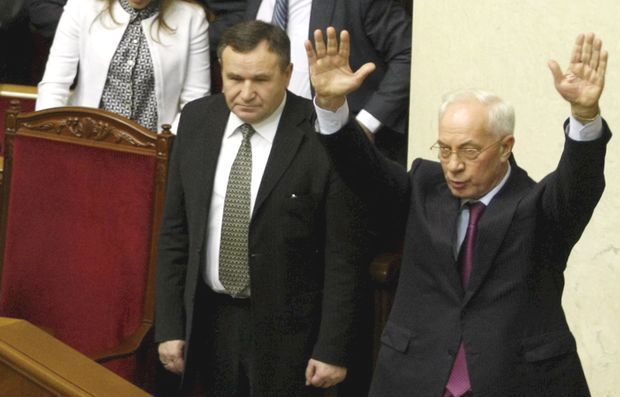“Russian” arguments of Ukraine’s prime minister
Or Why Mykola Azarov met with the ambassadors of the EU, Canada, and the US
“We have not heard anything new from the Ukrainian prime minister, except the old approaches and incomprehensible arguments on the state of the Association Agreement. He talked as if Ukraine had had no representation at the negotiations or they had not defended the interests of Ukraine,” a European ambassador told The Day on condition of anonymity about his impressions after meeting with Prime Minister of Ukraine Mykola Azarov. Our interlocutor also noted that Ukrainian government used a bizarre argument when stating that the economic situation has worsened in the past six months.
He said it was actually progressively worsening for over a year and a half and Ukraine was unable to put the economy back on its feet throughout that time.
The diplomat saw Azarov’s argument that Ukraine’s need for assistance amounted annually to 20 billion dollars as a bizarre one, too, in particular when complemented with the question about the costs of German reunification. According to the ambassador, all his colleagues listened with eyes wide open in surprise to this question, as it was totally irrelevant to what is happening with the Ukrainian economy.
In addition, Azarov actually accused ambassadors of meeting with the opposition, the diplomat said: ”We meet with those who we want to, we do not stage protests, but support the civil society,” he said, adding that it was clear to them now that “the prime minister has zero European thinking or even compatibility with European thinking.”
“We heard the Russian arguments there, not European or even Ukrainian,” our interlocutor said. He saw the ambassadors surprised at Azarov’s joke about possible US hand in organizing protests in Ukraine. Joke it might be, but it showed that Ukrainian prime minister believed that mass protests in Ukraine were sponsored by foreign actors and, moreover, he was influenced by Moscow’s advice, which was the original source of that wild figure of 160 billion dollars, the diplomat said. According to him, Azarov’s thoughts were not just his own, but expression of the views of a group of people in power who had lost the trust of the people.
Ambassador was wondering, what could Deputy Prime Minister Serhii Arbuzov hope to achieve on his delegation’s visit to Brussels at the invitation of the European Commission President Jose Manuel Barroso? After all, Europeans have made it clear that the EU will not go to tripartite talks on association. “You are a sovereign country. Are you opening up to Russia already?” the diplomats asked Azarov.
The conversation touched upon the topic of stabilization aid for Ukraine, and the Europeans stated: “We support Ukraine’s European path, and the government stabilization needs can be met over the coming decade, subject to the signing of the Association Agreement.”
Also, Europeans did not understand Azarov’s argument that Ukraine had first to make peace with Russia, and only then to sign the agreement. “For me,” the diplomat said, “it sounded as if Ukraine had to submit to Russia, this is my take on the Ukrainian prime minister’s words. Moreover,” he added, “I see that the Ukrainian government is seeking short-term solutions, not for the country, just for themselves. They took thinking from the Soviet past and combined it with today’s capitalism.”
The European diplomat also confessed that he had said to Foreign Minister of Ukraine Leonid Kozhara: “You think that Russia will sell you gas at 260 dollars per 1,000 cubic meters, but it will demand as payment that you freeze relations between Ukraine and the EU for good. Therefore, the solutions offered by Russia are short-term and consistent with the interests of some people in power rather than the entire Ukrainian people.
“The doors of Europe remain open to Ukraine, we are interested in the country and its people, not its politicians. We will not amend the Association Agreement, but its implementation is impossible without reforms, and will be not a ticket to paradise, but a lot of hard work, because the Ukrainian economy is almost completely broken at the moment,” the diplomat said.
By the way, President of Ukraine Viktor Yanukovych and President of the European Commission Jose Manuel Barroso spoke by phone on December 2. Barroso’s spokesman Mark Gray told The Day that the sides discussed the situation in Ukraine and agreed on the following points:
1) all parties should exercise restraint;
2) all civil rights and freedoms must be respected;
3) the use of force by the police must be investigated as soon as possible;
4) it is important that the Ukrainian authorities start cooperating with all relevant political forces immediately;
5) peaceful political solution is Ukraine’s only way out of the current situation.
President Yanukovych agreed with this approach and clearly confirmed his intention to investigate the use of force by the Ukrainian police and inform the public about the results, the spokesman said. According to him, president of Ukraine asked the European Commission to receive a delegation from Ukraine for a discussion of some aspects of the Association Agreement and the Deep and Comprehensive Free Trade Area. Barroso reiterated the readiness of the European Commission to receive such delegation provided it would be of an appropriate level. He noted that the European Commission was ready to discuss aspects of realizing the initialed agreements, but would not reopen any kind of negotiations. The delegation would be a political-level one, the spokesman told The Day. He added that these conditions were accepted by President Yanukovych, and it was decided that the timing and level of these consultations should be determined via the appropriate diplomatic channels.






